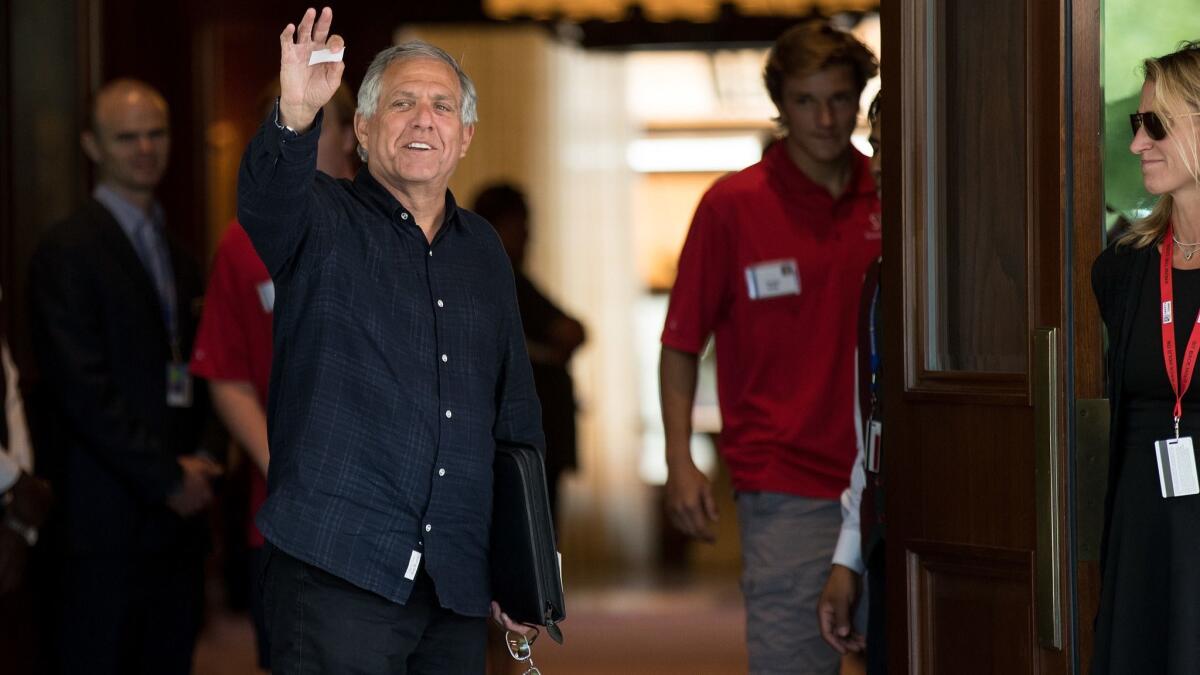CBS’ Leslie Moonves sex scandal: Portrait emerges of a culture of fear, entitlement — and little accountability

- Share via
Leslie Moonves was a television great.
CBS Corp.’s former chief executive turned a moribund network into America’s most watched. He had a knack for picking hit shows, creating stars out of nobodies and minting millions of dollars in returns for investors.
Wall Street loved him. Advertisers were in awe. CBS board members made him one of America’s highest-paid executives — his compensation last year topped $69 million — and a tight circle of executives gave him their unconditional support.
And that was the problem.
This week, high-powered lawyers who have been investigating Moonves’ alleged sexual misconduct are expected to deliver their findings to CBS’ board. With each new revelation, a portrait has emerged of a culture of fear, entitlement and little accountability at the legendary broadcasting company known for NFL football, news magazine “60 Minutes,” “NCIS” and “The Big Bang Theory.”
Moonves’ reign, which abruptly ended when he was ousted Sept. 9, seems to be a throwback to an earlier era in Hollywood, when the town was ruled by larger-than-life bosses who demanded attention, extreme loyalty and sex from the people who wanted to be in pictures.
“Old Hollywood was rife with this type of behavior,” said Jonathan Kuntz, film historian at the UCLA School of Theater, Film and Television. “You have beautiful young people seeking jobs, a lot of money involved and powerful people as the gatekeepers. And some of those powerful people take advantage of the situation.”
The report by CBS’ investigators is expected to show that Moonves, 69, sought to mislead investigators and destroyed evidence in an effort to salvage his reputation and preserve his claim to $120 million in severance pay. Instead of handing over to investigators the iPad he used for work, Moonves turned in his 9-year-old son’s device, according to the New York Times, which reviewed an executive summary of the draft report.
The investigators also are said to have found that Moonves “received oral sex from at least four CBS employees under circumstances that sound transactional and improper” because there was no hint of romance or a relationship between the CEO and the underlings.
Moonves was “evasive and untruthful at times and … deliberately lied about, and minimized the extent of his sexual misconduct,” according to the draft report. It is not clear when the sexual misconduct was said to have occurred. But people familiar with CBS, including current and former employees, said they suspect that most of the alleged incidents occurred in the 1990s, when Moonves ran the Warner Bros. Television studio and when he became head of CBS Entertainment.
The investigators, according to the draft report, have concluded that CBS’ board has justification to fire Moonves for cause — denying him any severance pay. The document also determined that the dismissal of former “60 Minutes” executive producer Jeff Fager was warranted because of inappropriate behavior.
A spokesperson for Moonves declined to comment on the draft report but said in a statement: “Mr. Moonves vehemently denies having any non-consensual sexual relations.”
Much of Moonves’ alleged misconduct occurred at a time when tales of bad-boy executives and producers, including Harvey Weinstein of Miramax, were rampant in the entertainment industry.
Moonves thrived at Lorimar Productions, and then as head of television at Warner Bros. He achieved great success leading the Burbank studio and developing such blockbusters as “Friends” and “ER” — hits that had propelled rival NBC atop the ratings. Moonves had a knack for figuring out which actors to cast in shows. He had been an actor himself early in his career, landing a handful of bit parts.
“No one has a better track record in terms of getting good shows on the networks and shows that work than Moonves does,” longtime Merrill Lynch analyst Jessica Reif Ehrlich said in 1995 when CBS hired Moonves to oversee entertainment.
He took over after a disastrous attempt to retool CBS’ prime-time schedule to appeal to the young viewers NBC was attracting. CBS had lost its NFL football contract to upstart Fox and CBS was in third place in the ratings, relying heavily on shows that played well in the heartland, such as “Murder, She Wrote” and “Walker, Texas Ranger.” Moonves recognized that cloning NBC’s lineup wouldn’t work, and he worked tirelessly to develop a distinctive personality for CBS programming.
Pressure was immense and workplace conditions were harsh, according to interviews with nearly a dozen current and former CBS employees. Executives put in long hours and worked to avoid the volcanic temper of the boss who had a corner office on the third floor of CBS’ Television City complex in Los Angeles’ Fairfax district. One of his assistants crafted a homemade “mood indicator” on the switch-plate of a light dimmer dial just inside the suite of executive offices.
“If it was bright red, you knew to come back the next day,” said one executive who worked at CBS in the late 1990s. The “mood indicator” quickly disappeared.
Still, executives standing in line outside his office would ask one another: “What’s the temperature today?”
“It was a culture of fear,” another former CBS executive said. “We were all like abused children — united in an effort of not being the one that Daddy was mad at.”
Industry veterans have long observed that CBS’ culture was markedly different from other networks’. Some called it the “cult of Les.” Unlike his peers, Moonves loved sparring with reporters at the twice-a-year Television Critics Assn. confabs in Pasadena and Los Angeles. Even as recently as May, Moonves was the master showman during CBS’ unveiling of its new fall schedule at the prestigious Carnegie Hall.
Publicists ensured that the spotlight was solely trained on the boss.
“He instilled great loyalty. It was always us against the world, we were going to take on everybody,” one of his former lieutenants said. “We really had a band of brothers mentality.”
By the late 1990s, CBS had begun to reverse its fortunes with such hits as “Everybody Loves Raymond,” “Survivor,” and “CSI: Crime Scene Investigation.” Moonves became even more invincible. Several people who have known him for years assumed that Moonves was “a player,” but said they were unaware of him demanding sex, including from subordinates.
In one alleged instance first reported by Vanity Fair, Dr. Anne Peters — an endocrinologist on the Westside of Los Angeles — reportedly described for investigators how, during a 1999 office visit, Moonves tried to force himself on her, then masturbated in a corner.
Some had an inside joke — “Les needs a massage” — when they saw the door to Moonves’ office was closed, according to a former executive.
“People probably didn’t want to know — and people probably didn’t talk about it,” said Diane M. Doolittle, a Northern California trial lawyer with Quinn Emanuel. “The people he targeted needed stuff from him. Or they might have worked for him. And these people probably genuinely feared turning him in because they didn’t have evidence and it would be their word against his.”
In 2000, CBS was sold to Viacom Inc., which was controlled by the Boston theater chain billionaire Sumner Redstone. The mogul himself has had a long history of extramarital affairs and scandals involving women. In fact, Redstone — now 95 and in poor health — continues to battle a former companion who contends she was wrongly removed from his will.
People who know Moonves said he settled down after his 2004 marriage to television personality Julie Chen.
Two years later, Redstone split his empire into two companies, and Moonves became chief executive of CBS. He had great latitude to manage the company as he saw fit. CBS prospered; its stock climbed from $5 a share a decade ago to more than $51 today. Moonves maximized fees charged to pay-TV operators to carry CBS’ signal and pushed into streaming by launching the CBS All Access service.
He was a fixture in the rarified list of America’s highest-paid executives, even though CBS is a medium-sized company. Forbes estimates his net worth at about $700 million.
But questions emerged about Moonves’ past behavior late last year in the wake of the Weinstein scandal and #MeToo. Rumors were flying that reporters from various news outlets were looking for dirt on Moonves.
On July 27, the New Yorker published an article with the accounts of several women who accused Moonves of making unwanted and inappropriate advances. The following week, CBS’ board hired two prominent female attorneys from different law firms to investigate.
Two firms were hired because of divisions on CBS’ board, which had clashed with controlling shareholder Shari Redstone over a possible merger with Viacom.
It is unclear how much CBS board members knew about the alleged behavior from decades ago. Moonves, for his part, told members of the board’s governance committee in January that a woman, Phyllis Golden-Gottlieb, had gone to the Los Angeles Police Department and alleged that Moonves forced her to give him oral sex in 1986 when the two were colleagues at Lorimar Productions.
By August, CBS’ board was rattled — but Moonves continued to have staunch supporters. In one board meeting, Arnold Kopelson, the Oscar-winning “Platoon” producer who died in October, is said to have told other board members: “I don’t care if 30 more women come forward … Les is our leader and it wouldn’t change my opinion of him,” according to the New York Times.
Then came more allegations from other women. The investigators have spent the last four months talking to 350 people. The CBS board has until Jan. 29 to inform Moonves of whether it will fire him for cause and deny him severance.
“It appears the board did the right thing” by hiring the investigators, said Jack B. Jacobs, a corporate governance expert. “The question is: Did they do it soon enough?”
Times staff writer Stephen Battaglio contributed to this report.
Twitter: @MegJamesLAT
More to Read
Inside the business of entertainment
The Wide Shot brings you news, analysis and insights on everything from streaming wars to production — and what it all means for the future.
You may occasionally receive promotional content from the Los Angeles Times.











